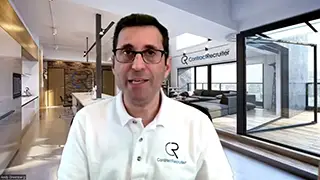Do your recruiters and hiring managers know the first rule of hiring? The law assumes that everything asked during job interviews will be used to make hiring decisions. Every interview question should be prepared with that in mind, and limited only to issues required to assess a candidate’s qualifications for the open position. Always avoid illegal, insulting, and irrelevant questions that don’t pertain to job performance and learn how to use legal interview questions.
If you want to get caught in the hot seat and have a laser spotlight on your company (not in a good way), ask questions during recruiting like the NFL asked of University of Colorado football player Nick Kasa: “Do you like girls?” Otherwise, you need to conduct employment interviews without asking illegal interview questions. That means planning legal interview questions about information related to job performance and avoiding questions about information that can lead to bias in hiring.
Plan and Prepare Legal Interview Questions
Don’t go into an employment interview without planning or try to “wing it.” That’s a recipe for illegal interview questioning. Plan the interview by scheduling a time and good location for it and preparing written legal interview questions about the essential skills and qualifications required for the opening. Don’t deviate from prepared questions, and have a worksheet during the interview to note answers and any questions the candidate may ask.
Make sure hiring managers and others who are involved in employment interviews are trained in fair hiring practices, and develop a written interview process to ensure no one conducts interviews without proper preparation.
Laws About Discrimination
The Equal Employment Opportunity Commission (EEOC) enforces laws that make it illegal to discriminate against protected categories of candidates. Those include age, race, color, creed, national origin, gender, disability, and genetic characteristics. Other categories protected under state law may include sexual orientation and marital status. Specific laws against discrimination in employment include Title VII of the Civil Rights Act of 1964, the Americans with Disabilities Act, and the Age Discrimination in Employment Act.
Avoiding illegal interview questions means not asking for information in these areas. The interview process is a pre-hire activity and anything asked in the recruiting process suggests that hiring decisions will be made based on the information uncovered from it. Asking candidates about things like their age, religious practices, or marital status gives the impression that the hiring decision will be based on the candidate’s answers, leading to legal liability.
Legal Versus Illegal Interview Questions
If you’re not totally clear about legal interview questions and illegal interview questions, you’re not alone. CareerBuilder found that one in five employers asks illegal interview questions unknowingly, and at least one third of hiring managers couldn’t tell if interview questions were legal or illegal. A good guide to use when interviewing is to use only questions that demonstrate job-related necessity for asking them, and do not use questions that could be used to screen out minorities or members of one sex.
While the EEOC has guidelines for employers regarding what they can ask legally about criminal records, there are many other areas that are off-limits during employment interviews. The Society for Human Resource Management (SHRM) reminds employers that even harmless intentions with illegal interview questions can lead to risk of legal action if candidates feel interview questions discriminate against them.
Focus on Job Relevance
Legal interview questions focus on job relevance, asking about a candidate’s ability to perform essential functions of the job. Ask questions about the candidate and don’t make statements that involve assumptions about a candidate’s abilities.
Focus on asking about ability to perform required functions, such as “This job requires traveling to client sites out of town every month. Are you able to travel for work?” Take care not to make assumptions or statements about visible disabilities such as wheelchairs or mobility impairments while asking about ability to perform job functions. “How long have you been in a wheelchair?” or “What happened to cause your disability?” are not legal interview questions.
Guidelines for Legal and Illegal Interview Questions
It’s important to avoid questions during a job interview that can lead to bias in hiring and focus on questions about job performance. The U.S. Equal Employment Opportunity Commission outlines the following guidelines for legal interview questions under Federal Law:
Subject |
Don’t |
Do |
| Age | Don’t ask how old a candidate is or for a birth date | Ask if the applicant can provide proof of being at least 18 |
| Alcohol or drug use | Don’t ask if a candidate is an alcoholic or has been addicted to drugs | Ask if a candidate currently uses illegal drugs |
| Arrest record | Don’t ask if a candidate has ever been arrested | No questions about arrest record are allowed |
| Citizenship | Don’t ask if a candidate is a U.S. citizen | Ask if the candidate is legally eligible to work in the U.S. |
| Disabilities | Don’t ask questions to find out how a candidate became disabled or what the disability is | Ask how the candidate would do the work and whether the candidate could do the job with or without accommodation |
| Marital and family status | Don’t ask if the candidate is married, has children or childcare, or is pregnant or planning to become pregnant | Ask whether the candidate can meet the work schedule |
| Name and national origin | Don’t ask about a candidate’s surname, national origin, ancestry, ethnicity, or prior marital status | Ask whether candidate has ever worked under a different name, is legally eligible to work in the U.S., and can communicate well enough to perform essential job functions |
| Race or color | Don’t ask any questions or make any comments about an applicant’s complexion, skin color, personal appearance | |
| Religion | Don’t ask about religious preference or affiliation unless the hiring institution is a religious affiliated institution | Ask instead whether the candidate can meet the work schedule |
| Sex | Do not ask about a candidate’s sex where it is not a bona fide occupational qualification | Only ask about candidate’s sex if the job has a bona fide occupation qualification for sex such as actor, actress, or locker room attendant |
Use a Consistent Interview Process
Carefully planning questions and using the same structured interview process for all candidates will help ensure equal treatment of all candidates and avoid illegal interview questions. Focus on job requirements and candidate performance and abilities for fair hiring practices and legal compliance.
Conclusion
Mastering the art of interviewing is more than just understanding the legal intricacies—it’s about curating a comprehensive experience that respects both the candidate and the standards set by law. In this rapidly changing professional landscape, the ability to conduct a fair, unbiased, and effective interview can be a game-changer for organizations. It not only ensures a compliant hiring process but also solidifies a company’s reputation as an ethical, forward-thinking employer.
By focusing on job relevance, preparing in advance, and continually educating ourselves on the ever-evolving legal framework, we can pave the way for a more inclusive, efficient, and successful recruitment process. Remember, every interview is not just an assessment of a potential employee but also a reflection of the company’s values, ethics, and commitment to excellence.
Need help hiring? Reach out to us and learn how we can tailor our staffing services to suit your unique needs.
Page updated on October 9, 2023.

